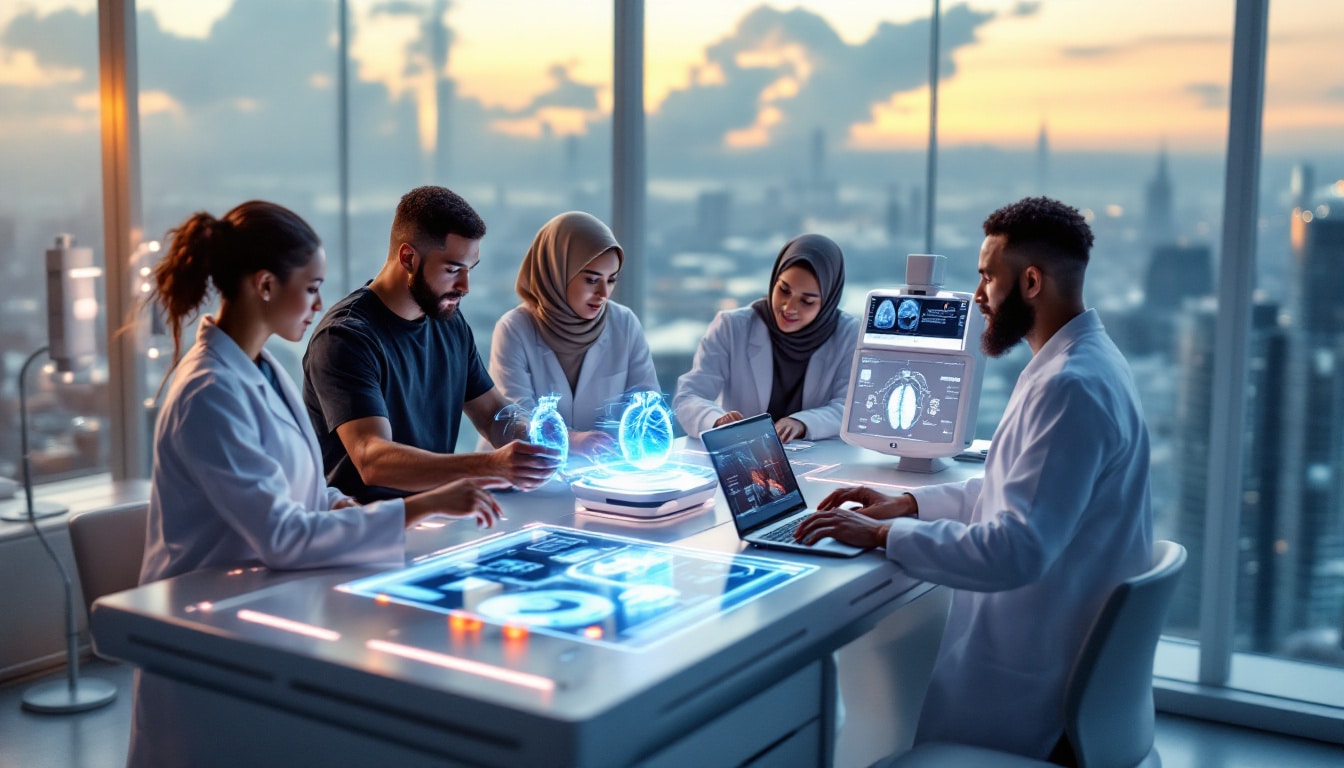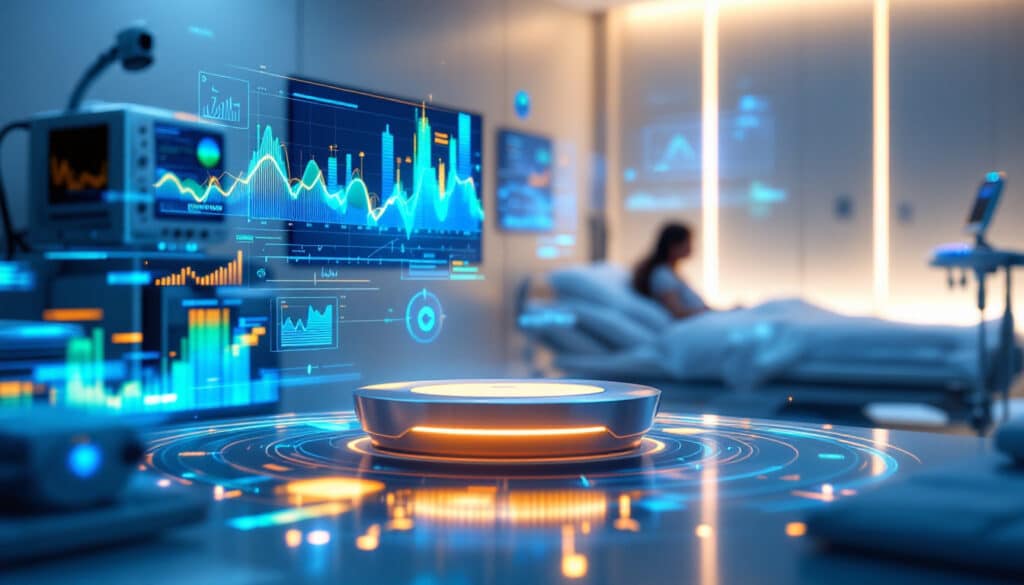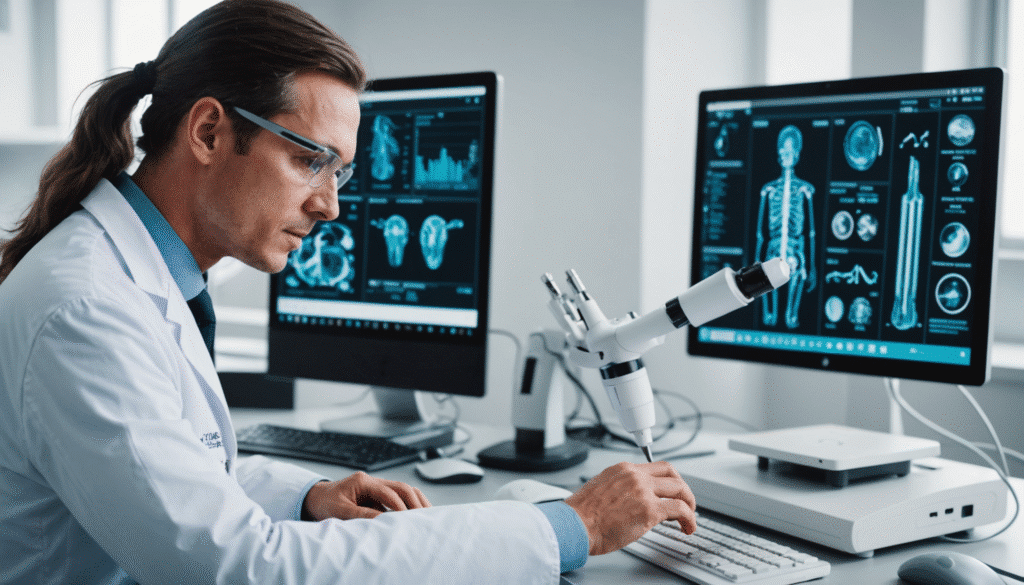The recent FDA approval marks a significant advance in the field of wireless brain-computer interfaces. This innovation opens new perspectives for a safer and more ethical use of BCI by researchers. Compared to high-risk intracortical devices, this system promises a more humane approach.
As a researcher passionate about medical innovations, I am excited about the possibilities offered by this cutting-edge technology. The transition to wireless systems represents a major step in enhancing patient safety and research effectiveness. The potential implications for patient well-being are immense, and this advancement could transform the medical landscape by providing more humane and sustainable solutions.

The FDA authorization opens new perspectives for brain implants
The recent FDA approval for a key component of the Precision Neuroscience brain implant marks a significant advance in the field of neuro technologies. According to BCI expert Naveen Rao, this authorization paves the way for a safer and more humane brain-computer interface (BCI), compared to high-risk intracortical matrices. This FDA decision is not merely a regulatory green light; it also stimulates research and development in a rapidly growing sector.
What are the advantages of Precision Neuroscience’s wireless brain-computer interfaces?
The new wireless brain-computer interfaces from Precision Neuroscience offer several advantages over previous technologies. First, they reduce the risks associated with intracortical implants, which require invasive procedures and can lead to complications. By simplifying the process and enhancing security, these wireless BCIs make the technology more accessible and acceptable for researchers and patients.
Moreover, this innovation facilitates ongoing research by allowing real-time adjustments and improvements without the need for removal or re-implantation of the device. According to Marion Webb from Precision Neuroscience, this advancement is a crucial step towards more sustainable and effective neurotechnological solutions. You can learn more about the recent FDA developments in the field of medical technologies.
How does this approval influence the neurotechnology landscape?
The FDA approval for the key component of the Precision Neuroscience brain implant has a considerable impact on the landscape of neurotechnology. By securing regulatory validation, the company strengthens investor and researcher confidence, thus promoting an increase in investments in this sector. This approval also serves as a model for other companies working on similar technologies, encouraging healthy competition and ongoing innovation.
Furthermore, this decision highlights the importance of international collaborations, as evidenced by the participation of the U.S. FDA in teleconferences during the IMDRF meeting in Tokyo. These exchanges facilitate the sharing of best practices and technological advances, thereby strengthening the global framework for neurotechnology research.
What is the potential impact on patients and researchers?
The FDA approval for this revolutionary brain implant has major implications for patients and researchers. For patients, this means access to safer and more effective medical technologies, capable of treating neurological disorders that were previously difficult to manage. For example, the recent FDA approval for an implantable gene therapy represents a major advance in treating rare visual disorders.
For researchers, this approval lowers the barriers to entry for experimenting and developing new applications of BCIs. It encourages a broader exploration of the potential offered by these technologies, ranging from the rehabilitation of patients with brain injuries to enhancing human cognitive abilities. By facilitating access to safer tools, the FDA helps accelerate the pace of scientific discoveries and medical innovations.
What are the next steps for the FDA in this field?
While this approval represents an important milestone, the FDA’s work in the field of medical technologies does not stop there. According to Shuren on the future of the FDA, the next steps will include the ongoing evaluation of emerging technologies and adapting regulations to address the challenges posed by rapid innovations. The FDA aims to maintain a balance between encouraging innovation and ensuring the safety and efficacy of new technologies.
Moreover, despite the recent significant staff reductions within the CDRH, as mentioned by Global Santé, the FDA continues to prioritize critical approvals and invest in regulatory research. This resilience demonstrates the agency’s commitment to support medical advancements while adapting to budgetary constraints.
How can advancements from Precision Neuroscience inspire other companies?
The FDA approval for the brain implant from Precision Neuroscience serves as an inspiration for other companies in the neurotechnology sector. By demonstrating the pathway to successful regulatory validation, Precision Neuroscience provides a model to follow for those looking to develop similar technologies. This success highlights the importance of quality research, ongoing innovation, and adherence to the highest safety standards.
Additionally, close collaboration with the FDA and other regulatory agencies shows that open and transparent dialogue is essential for navigating the complex landscape of medical regulations. Companies can learn from this approach to accelerate their own development and approval processes.
What are the future challenges for neuro technologies?
Despite significant progress, several challenges remain for neuro technologies. One of the primary obstacles is the need to ensure long-term safety of brain implants. Researchers must continually assess and improve the biocompatibility of the materials used, as well as the durability of the implanted devices.
Another major challenge is the cost associated with the development and implantation of these technologies. While FDA approval opens the door to wider adoption, costs remain a barrier for many patients and research institutions. Future efforts will need to focus on cost reduction while maintaining high standards of quality and efficacy.
What is the importance of international collaborations in this sector?
International collaborations play a crucial role in advancing neuro technologies. By working with global partners, companies like Precision Neuroscience can access diverse expertise and additional resources, thereby accelerating the pace of innovation. Moreover, these collaborations facilitate knowledge sharing and best practices, which are essential for overcoming scientific and regulatory challenges.
For example, the FDA’s participation in international teleconferences illustrates the importance of global cooperation in developing advanced medical technologies. These interactions strengthen research networks and allow for standard harmonization, benefiting the entire industry.
What future lies ahead for neurotechnology after this approval?
The FDA approval for the brain implant from Precision Neuroscience represents just the beginning of a new era for neurotechnology. With this validation, researchers and developers are encouraged to explore new applications and push the boundaries of what brain-computer interfaces can achieve. Possibilities include treating neurodegenerative diseases, enhancing cognitive abilities, and even direct interaction with computing devices.
As technology progresses, it is likely that we will see increased integration of BCIs into personalized medicine, offering tailored treatments for specific conditions. The FDA’s ongoing commitment to support innovation while ensuring patient safety will create an environment conducive to the rapid and responsible growth of this sector.
To stay informed about the latest news and innovations in the field of the FDA and medical technologies, visit our page on medical regulators.
The FDA authorization for the key component of the brain implant from Precision Neuroscience marks a significant step in the field of brain-computer interfaces. This approval paves the way for more in-depth research and an accelerated development of innovative technologies that promise to transform the medical landscape.
By offering a safer and more humane alternative to high-risk intracortical arrays, this new implant allows researchers to work under optimized conditions, thereby reducing potential complications while increasing the efficacy of studies. This technological advancement not only facilitates access to research but also encourages interdisciplinary collaboration, essential for pushing the boundaries of medical innovation.
According to BCI expert Naveen Rao, this approval by the FDA is a catalyst for the industry, stimulating increased interest and investments in the sector. Investors and researchers now see a promising future where BCI devices can significantly contribute to improving the health and well-being of patients, offering advanced technological solutions for previously challenging conditions.
Moreover, this authorization strengthens stakeholders’ confidence in the viability and safety of new medical technologies. It encourages the rapid adoption of these innovations by health institutions, thus accelerating their integration into standard clinical practices. The impact of this decision will likely reverberate throughout the industry, fostering an environment conducive to continuous innovation and the emergence of new therapeutic solutions.
In summary, the FDA authorization for the component from Precision Neuroscience is a victory for the scientific and medical community. It promises to not only stimulate research and development but also lay the groundwork for a new era in the treatment of neurological conditions, where technology and humanity come together to offer unprecedented perspectives.














